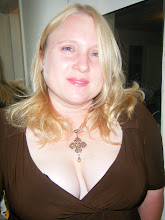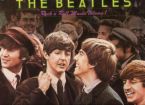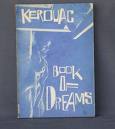 Reflections on On The Road
Reflections on On The Road
by Jack Kerouac
- third time around
The first time I read On the Road, I was seventeen, and it made quite an impression. It was one of those defining books of those years, I remember, although I can't remember specifically what I liked about it. I remember thinking that Kerouac's writing style was fresh, and admiring the complete freedom of the characters in the story. The second time I read it, I was in college and found it tedious, but I suspect this was because I was reading a lot of Tom Robbins and so Kerouac's writing style lost the freshness factor to me. I had become enraptured with pop philosophy and quirky characters, which seems semi-ironic now for me to say that because these elements are present in On the Road, but it is just not as in-your-face obvious as it is in a Robbins novel.
This third time around it was neither fresh nor tedious, and perhaps more enjoyable on several levels because I understand more of the history behind the novel and in the novel. In between this reading and the last one, I have read several more Kerouac books and books on Kerouac or Neal Cassady, most notably in terms of pertinence to the story Carolyn Cassady's book Off the Road. Carolyn was romantically involved and/or married to Neal during the time period that On the Road covers, between 1947 and 1950, and between her perceptions of the events and the understanding of the history of the two men that has evolved as I have educated myself more thoroughly on their lives, I developed a totally different impression of the novel through this more recent reading.
One of the primary impressions I obtained this time around was the sense of place as vital to the story. When I was a teenager reading the book, I was most impressed with what the two main characters - "Sal Paradise" as Kerouac himself and "Dean Moriarty" as Cassady - were doing in these incredible cross country road trips, but this time around I recognized that place was the unnamed third main character, filling in the emotional and physical context of the action. On the Road is essentially a period piece that gives one a snapshot of what postwar America was like, both generally and specifically. As the travelers enter each city, drive through each state, they experience the place so deeply that it becomes them, defines them, shapes them. The concise descriptions of place and detail of person are the strengths of this novel, and the strength in Kerouac's writing, the reason for his lasting significance as a cultural American icon defining a genera
 tion.
tion.
A second realization I got this time around that somehow I didn't catch through all my studying of the character of Neal Cassady before was a strong sense of mental imbalance. My impression before, even in reading Carolyn's impressions on their life together, was that he was a fascinating man with some interesting qualities who was also self-absorbed, selfish in his dealings with others. He would have been hell on a heart, all heat and madness and pledges of undying love while chasing other women on the side and taking off at a moment's notice, disappearing for months, the frantic unreliability of his nature. This reading, though, I saw little details that caused me to think that in this day and age, Cassady would have been labeled with some mental illness or another if he had ever walked into a psych office: the manic phases (driving hundreds of miles without sleeping, the frantic speech), his physical habits such as twitching and sweating, his compulsive womanizing, the way he acted on sudden urges to move and just left, took off, without consideration for others he was involved with. I also saw that Kerouac himself recognized this fact, and was at times both frightened and intrigued by it, but drawn to it as well.
Here is an excerpt to prove my theory from Part Four, when Kerouac is preparing to leave Denver for Mexico and finds out Cassady has bought a car and is on his way down to join him, unexpectedly:
Suddenly I had a vision of Dean, a burning shuddering frightful Angel, palpitating toward me across the road, approaching like a cloud, with enormous speed, pursuing me like the Shrouded Traveler on the plain, bearing down on me. I saw his huge face over the plains with the mad, bony purpose and the gleaming eyes; I saw his wings; I saw his old jalopy chariot with thousands of sparking flames shooting out from under it; I saw the path it burned over the road; it even made its own road and went over the corn, through cities, destroying bridges, drying rivers. It came like a wrath to the West. I knew Dean had gone mad again. There was no chance to send money to either wife if he took all his savings out of the bank and bought a car. Everything was up, the jig and all. Behind him charred ruins smoked. He rushed westward over the groaning and awful continent again, and soon he would arrive.
Although I have my reasons for continuing to idolize the nature of Kerouac and Cassady, this reading gave me great feelings of discomfort in terms of the relationships these men had with women. It was reminiscent of the way I felt watching "Walk the Line", the uncomfortability I felt with Johnny's relationship with June Carter. I didn't stop liking the music of Cash, but I empathized more with his first wife, understanding her anger at his betrayal in his obsessive attraction for June. In the same respect, this time I was not comfortable with Cassady's three significant relationships, the way he fooled around with his second wife while with the first and also vice versa, the way he immediately hooked up with wife #3 in New York and immediately called home for a divorce from Carolyn, aka "Camille", while she was pregnant with their second child, only to leave the third wife right after marrying her (who also carried his child) to return to Carolyn in San Francisco, all the while trying to make girls on the side during the cross country trips (and let's not forget the bordello scene in Mexico City). When I was a teenager, I saw this as a physical manifestation of their "freedom", freedom from moral constraints being a part of it, but at this point in my life, I find I am uncomfortable walking this line. I just feel sick for the women in his life. Although Kerouac was not quite as concerned with his penis, there is still some knowledge I have about his life that makes me upset to read, at the end, what he writes about his last affair in the novel.
....So I went up and there she was, the girl with the pure and innocent dear eyes that I had always searched for and for so long. We agreed to love each other madly....
because I suspect, based on the timing, that this is Joan Haverty, his second wife, who gave birth to a daughter Jan, who only met her father twice in her life - once at a court hearing for child custody when the girl was ten, and once when she was fifteen and showed up at his doorstep in a desperate longing to connect with the father she had never known. He died two years after that meeting, while married to wife number three.
The point of all this talk is that these men, both of them, were heels on the hearts of women, who promised undying and forever love when it was only fleeting, transient, and when it suited their purposes. Both men seem to be seeking that connection, whether it is with a soulmate or the spark of the divine on earth, and their visceral experience is one of the seeker, the searcher, who is destined to be alone, but through devices of their own doing. In Kerouac's case, I think that was part of what made him such an incredible writer, this sort of melancholy searching through desperate kicks and long road trips for that which he would neve
 r find, but at the same time it speaks of the futility of love, generally, and the attitude of these men towards women specifically.
r find, but at the same time it speaks of the futility of love, generally, and the attitude of these men towards women specifically.
In the end, though, it is Kerouac's writing style that really makes my heart flip and my head swim. In this book, it is particularly beautiful on parts three and four, in the last half of the book. Perhaps the first part of the story Kerouac was just trying to spit out there, get the specifics down, since it had been a few years since those journeys by the time he wrote the book, but the last part, being more recent, had fresher emotional context. It was the way he phrased his words, the way he described every detail, the way he told a story that gets me, and I think gets other people as well. He was a writer, and a darn good one at that. I wanted to pull the best part out and show it to you, to prove it to everyone, to display what it is that makes him remarkable, but nothing I could do is better than this video of him reading the very last page of this book in the notably "beat" fashion. So dig it.....


























No comments:
Post a Comment